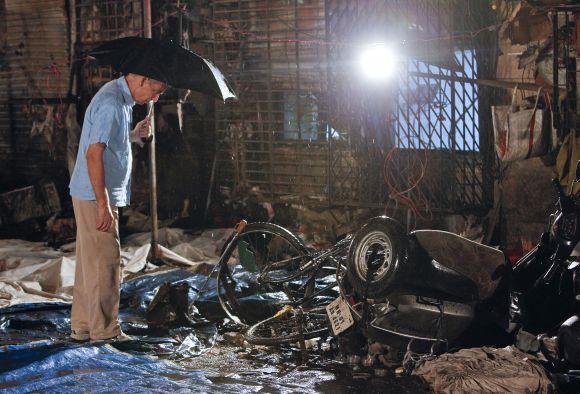
The setting up of the National Counter Terrorism Centre was not a smooth affair after all. A body that was formed to fight terrorism today faces a rough ride with several states, particularly the ones ruled by Bharatiya Janata Party and non-Congress governments, voicing concern and stating that it would disrupt the federal structure.
The states have not been spelling out their concerns in detail, but on the face of it, it appears that some states are more concerned about the sweeping powers that NCTC has been given will override the powers of the states, thus turning the body into a 'Frankenstein monster' under the absolute control of the central government.
How does the formation of the NCTC shake up the federal structure? It is a well known fact that law and order are subject matters of the state prescribed under the Indian Constitution. However there is also Article 342 of the Constitution which gives the Centre powers to prevent illegal activities in any part of the country. While this being the debate, rediff.com's Vicky Nanjappa spoke to three people who have widespread experience in dealing with security, legal and state issues.
Before getting into the debate it would be interesting to see what is 'India's federal structure'. The Constitution provides for distribution of powers between the Union and the states. It enumerates the powers of the Parliament and state legislatures in three lists, namely union list, state list and concurrent list.
Subjects like national defence, foreign policy, and issuance of currency are reserved to the union list. Public order, local governments, certain taxes are examples of subjects of the state list, on which the Parliament has no power to enact laws in those regards, barring exceptional conditions.
Education, transportation, criminal law are a few subjects on the concurrent list, where both the state legislature as well as the Parliament have powers to enact laws. The residuary powers are vested with the Union.
...
Please click here for more Realtime News on NCTC row!
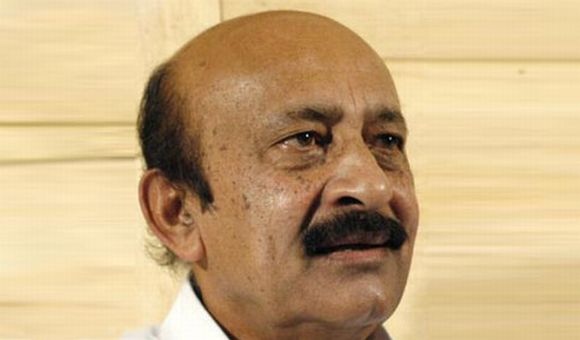
M C Nanaiah, former Karnataka law minister, says, "Many states have raised fears that the NCTC could become partisan and political in nature. Yes, law and order are subject matters of the state and if the Centre is trying to override it with the creation of the NCTC, then it does affect the federal system as the Constitution makes it clear that law and order are subject matters of the state government.
"As far as fighting terrorism is concerned then under Article 342 of the Indian Constitution, the central government has the right to prevent illegal activities of this nature. Terrorism is a matter that spreads across the country. It is not just a subject matter of the Union government alone. It is better to deal with such matters by means of interaction and not take independent decisions," Nanaiah says.
"What I fail to understand is why has the central government gone ahead and come up with something without proper consultation? Why not call for a meeting of all home ministers, top ranking police officials of the state before arriving at a conclusion? The very fact that the government of India has not thought this to be necessary itself shakes up the federal system," he adds.
"States have an important role to play in law and order and they need to be consulted, failing which it is opposed to the concept of a federal set up."

"Counter-terrorism cannot be the responsibility of the central government alone. States have a role to play by feeding or passing on information and hence all have to work in tandem. If the Union government feels that it is not necessary to keep the states in the loop then it is taking away the powers of the state governments in matters enshrined under the Constitution. The states fear that it will lose its independence and the NCTC will become political and partisan in nature," Nanaiah also says.
"In cases of terrorism it is the state and also its people who will be affected. Tackling terrorism is everyone's problem and hence there needs to be consensus on the issue. The NCTC could well misuse its powers and this is what the state governments fear.
"A federal system mandates that the Union and state governments work in tandem and going by the manner in which this issue is handled it becomes clear that the Union government wants to impose its will all by itself. There is an urgent need to call for a meeting and then arrive at a consensus. For a federal system to work fine there is a need to cooperate," the former minister notes.
"There is an absolute need for cooperation. Ultimately it is a concern of the people the entire country. There is external and internal terrorism. None can override the Constitution and hence the central government should have in its wisdom taken up the issue only after proper consultation with the state governments. Here what I gather is that the central government has created a body which will do nothing but step in and study the issues in the state. This could be a very dangerous precedent and hence there is every need to involve the states," he says.
"Instead of prolonging this issue and furthering the controversy it would be better to call for a meeting chaired by the prime minister and address all concerns once and for all," he adds.
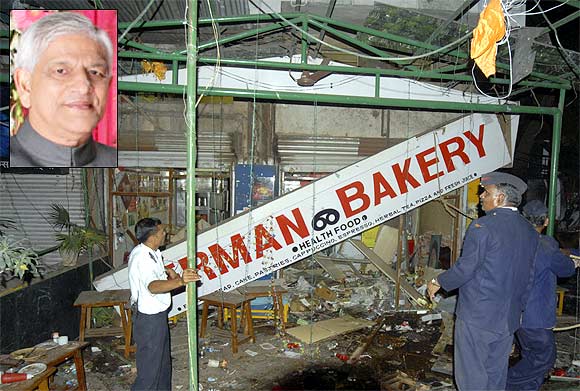
C D Sahay, former chief, Research and Analysis Wing, has a slightly different opinion. He says, "There are many sides to this debate. There is a legal issue, and what one also needs to study is what the differences of perception which fall within the realm of the state. Law and order is the responsibility of the state and this is how our federal system is structured. However, by the same token, one cannot compromise on national security."
"In such a respect and in order to upkeep the federal nature of our state there should be a more positive approach and the issue needs to be dealt in a more cooperative manner. It is always better to evolve consensus on such major issues," he adds.
"Moreover terrorism is a national concern and hence there ought to be a consensus on the subject. Issues of national security have been discussed so often in chief minister's conferences and yet I do not know why this subject was not taken up and a consensus arrived at," he wonders.
"Now to the other question as to why the states are crying foul and term the formation of the NCTC as a setback to the federal structure. Are the states trying to score political points? I think what must be worrying them is that here is a new organisation which has been created and has not been given a charter of only collecting intelligence. The intelligence would flow from the existing intelligence organisations and this body would have the powers to conduct searches and also carry out arrests without the consultation of the state machinery. This I think must be worrying the state governments," Sahay says.
"The NCTC would be working under the Intelligence Bureau and in effect what would happen is that it will become an arm of the intelligence collection agency. Now here is a deadly cocktail where one collects intelligence, which is in the first place a hush-hush affair. Then the same is analysed, evaluated and then the agency proceeds to carry out an arrest. If one needs to deal with terrorism then it may appear to be a very effective approach," he adds.
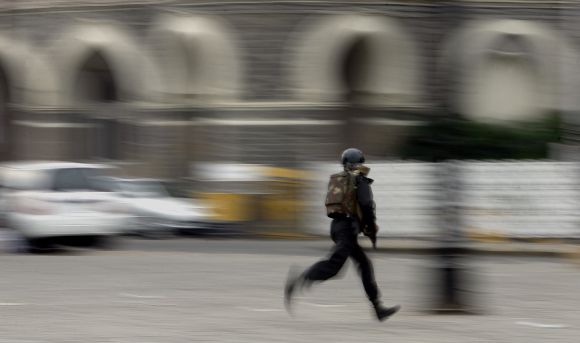
"However, it could be dangerous as well considering the sweeping powers this agency has been given. Effectively you could be creating another Inter Services Intelligence (Pakistan's spy agency). This body has been bestowed with nationwide powers and such activity is carried out without consultation with the states. Here is where the issue begins as this is not what is prescribed under the running of a federal set up," he says.
"In such a scenario there would be no checks and balances. Take the CBI for instance which is being used more often than not for political purposes. An NCTC as long as it is used for national security purposes is fine. The big question arises, what if it is not?" Sahay wonders.
"There is a grave need to study the powers of this body and also ensure that the states are kept in the loop to a large extent. The other debate to the kind of powers that the NCTC has been given could be understood when we take into account a 26/11 type of attack. Bits and pieces of information was shared, but did Maharashtra get their act right? No, they failed pathetically. Had there been an NCTC at that time, it is presumed that it would have collected the intelligence, analysed the same before activating itself only to have handled the situation much better," he notes.
"I do agree that with the formation of the NCTC, the show across the country will be run from New Delhi. If misused then the central government could run riot and shake up the federal set up and also powers that the state governments enjoy. But somewhere along the line there is a need to sit down and work out a compromise. I would say this as this issue is too important for it to be derailed," he says.
"There is a legal debate too involved in this where the power of the state governments to handle law and order is concerned. We need to think what the framers of the Constitution analyse? One needs to take into account the current scenario and challenges that were not present at the time our Constitution was framed. Terrorism is not a simple law and order matter and more often than not this crime has no jurisdiction and has inter-state and also international ramifications," he notes.
"While fighting national security we do need to take a lot of factors into account. The federal set up prescribes that the state and Union work in tandem and this issue cannot be left out too. We need to think in a cool and calm manner and understand the issue. Address the concerns of the state governments, have checks and balances, but do not dilute it to an extent that it becomes ineffective. However, at the end of it one must also keep in mind that if this new entity does not have the powers to operationalise intelligence, then what is the use of such a body?" he adds.
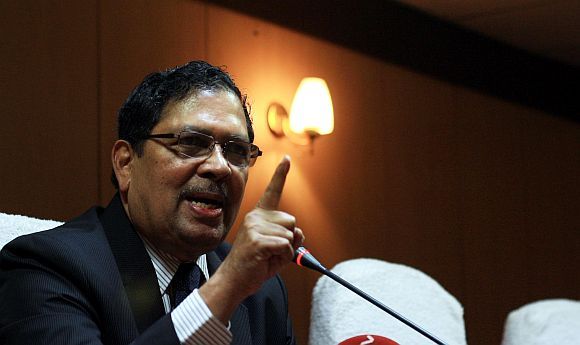
Justice Santosh Hegde, former Supreme Court judge and Karnataka Lokayukta, says, "Yes I do think that this would shake up the federal structure of our country. Law and order is a state subject and all laws are under the control of the state. However at the same time the Union government too has an obligation in this subject. A consensus is the need of the hour and it is sad to note that in this case central diplomacy has been lost."
"A federal set up mandates that work is carried out in tandem. A central government cannot eat into the powers of the states as this could set a dangerous precedent as the NCTC would be bestowed with sweeping powers to such an extent that it overrides the powers of the state," he says.
Justice Hegde, who was also a member of the joint drafting panel for the Lokpal Bill, says, "This is however not the first time that the federal set up is being threatened. Even during the Lokpal issue the same sort of thing happened. The states were not consulted. The basic requirement of a federal set up is that the Union government keeps the states informed and everything is done in consultation when it is a subject of national interest."
"The Union government should have called for a meeting of the state governments and the chief ministers. There are states which are troubled by terrorism and they would have required central help. When this being the case, there has been a complete lack of diplomacy and a large amount of arrogance on part of the central government.
"If they forcefully keep their forces in the states then it affects out federal policy. In federalism one needs to take into consideration the views of the partner, in this case the partner being the state government. If you try and prove that you are the strongest then it leads to disruption of the federal policy of the state," he adds.
...